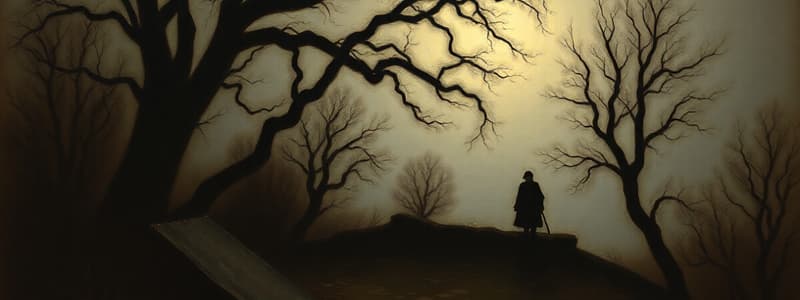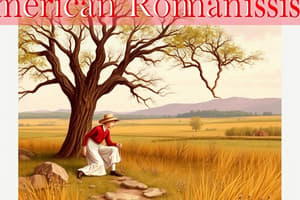Podcast
Questions and Answers
Which literary device is Edgar Allan Poe most recognized for employing in his works?
Which literary device is Edgar Allan Poe most recognized for employing in his works?
- Extensive use of alliteration and assonance to establish rhythm and mood.
- Blending symbolism, atmosphere, and psychological depth. (correct)
- Realistic portrayals of everyday life and common people.
- Satire and irony to critique social norms.
How did Agatha Christie's experiences during World War I influence her writing?
How did Agatha Christie's experiences during World War I influence her writing?
- Her time spent abroad led her to set many of her novels in exotic locations.
- She met many soldiers who shared their war stories, which she adapted into her crime fiction.
- Her exposure to medicine and poisons as a nurse and dispenser provided knowledge that she later incorporated into her mystery novels. (correct)
- She developed an interest in military history, which inspired her to write war novels.
What is a key element that distinguishes Sherlock Holmes from other detectives in literature?
What is a key element that distinguishes Sherlock Holmes from other detectives in literature?
- His reliance on intuition and gut feelings to solve crimes.
- His eccentric personality and struggles with substance abuse.
- His systematic use of deductive reasoning and forensic science. (correct)
- His close relationships with the local police force.
In what way did Edgar Allan Poe's personal life impact his literary works?
In what way did Edgar Allan Poe's personal life impact his literary works?
How does Agatha Christie typically structure her novels to create suspense and mystery?
How does Agatha Christie typically structure her novels to create suspense and mystery?
What narrative role does Dr. John Watson fulfill in the Sherlock Holmes stories?
What narrative role does Dr. John Watson fulfill in the Sherlock Holmes stories?
What unique element did Edgar Allan Poe introduce to the detective fiction genre with his character C. Auguste Dupin?
What unique element did Edgar Allan Poe introduce to the detective fiction genre with his character C. Auguste Dupin?
What aspect of Agatha Christie's personal life is reflected in novels such as 'Death on the Nile' and 'Murder in Mesopotamia'?
What aspect of Agatha Christie's personal life is reflected in novels such as 'Death on the Nile' and 'Murder in Mesopotamia'?
In 'The Final Problem,' what event led to public demand for the return of Sherlock Holmes?
In 'The Final Problem,' what event led to public demand for the return of Sherlock Holmes?
Which of the following best describes the writing style of Edgar Allan Poe?
Which of the following best describes the writing style of Edgar Allan Poe?
What is the significance of 221B Baker Street in the Sherlock Holmes stories?
What is the significance of 221B Baker Street in the Sherlock Holmes stories?
How did Agatha Christie's 'The Murder of Roger Ackroyd' (1926) distinguish itself?
How did Agatha Christie's 'The Murder of Roger Ackroyd' (1926) distinguish itself?
Besides Sherlock Holmes stories, what other genres did Arthur Conan Doyle explore in his writings?
Besides Sherlock Holmes stories, what other genres did Arthur Conan Doyle explore in his writings?
Which characteristic is most associated with Agatha Christie's detective Hercule Poirot?
Which characteristic is most associated with Agatha Christie's detective Hercule Poirot?
What is Edgar Allan Poe credited with inventing?
What is Edgar Allan Poe credited with inventing?
What inspired Arthur Conan Doyle to write a book defending British actions during the Second Boer War?
What inspired Arthur Conan Doyle to write a book defending British actions during the Second Boer War?
Miss Jane Marple is different from other detectives due to what?
Miss Jane Marple is different from other detectives due to what?
What themes are most explored in Edgar Allan Poe's short stories?
What themes are most explored in Edgar Allan Poe's short stories?
Why was Arthur Conan Doyle knighted in 1902?
Why was Arthur Conan Doyle knighted in 1902?
Considering the scope of her work, which of the following statements best reflects Agatha Christie's legacy?
Considering the scope of her work, which of the following statements best reflects Agatha Christie's legacy?
Flashcards
Edgar Allan Poe
Edgar Allan Poe
American writer, poet, editor, and critic, known for tales of mystery and the macabre.
Poe's Genre Influence
Poe's Genre Influence
Poe's contribution involves establishing the detective fiction and science fiction genres.
"The Murders in the Rue Morgue"
"The Murders in the Rue Morgue"
The first detective story, introducing C. Auguste Dupin.
Hercule Poirot
Hercule Poirot
Signup and view all the flashcards
Miss Jane Marple
Miss Jane Marple
Signup and view all the flashcards
Agatha Christie's trademarks
Agatha Christie's trademarks
Signup and view all the flashcards
Sir Arthur Conan Doyle
Sir Arthur Conan Doyle
Signup and view all the flashcards
"A Study in Scarlet"
"A Study in Scarlet"
Signup and view all the flashcards
Sherlock Holmes
Sherlock Holmes
Signup and view all the flashcards
Dr. John Watson
Dr. John Watson
Signup and view all the flashcards
"The Hound of the Baskervilles"
"The Hound of the Baskervilles"
Signup and view all the flashcards
Poe's Detective Legacy
Poe's Detective Legacy
Signup and view all the flashcards
Agatha Christie's hallmark
Agatha Christie's hallmark
Signup and view all the flashcards
Sherlock's core skillset
Sherlock's core skillset
Signup and view all the flashcards
Poe's Recurring Themes
Poe's Recurring Themes
Signup and view all the flashcards
Christie's poison expertise
Christie's poison expertise
Signup and view all the flashcards
Holmes's resurrection
Holmes's resurrection
Signup and view all the flashcards
Study Notes
Edgar Allan Poe (1809-1849)
- Edgar Allan Poe was an American writer, poet, editor, and literary critic, considered part of the American Romantic Movement.
- He is best known for his poetry and short stories, particularly his tales of mystery and the macabre.
- Poe is widely credited with inventing the detective fiction genre and is further recognized for contributing to the emerging genre of science fiction.
- Born in Boston, Massachusetts, he was orphaned at a young age and taken in by John and Frances Allan in Richmond, Virginia, though he was never formally adopted.
- After brief periods in the army and at West Point, Poe dedicated himself to writing.
- His early literary career was marked by financial struggles, leading him to work as an editor for various literary journals.
- Poe's personal life was fraught with tragedy, including the early death of his young wife, Virginia.
- He battled issues of depression, alcoholism, and general instability throughout his adult life.
- "The Murders in the Rue Morgue" (1841) is considered the first detective story, introducing the character of C. Auguste Dupin.
- Dupin uses intellect and observation to solve crimes, setting a template for future detectives in literature.
- Other notable works include "The Mystery of Marie Roget" (1842) and "The Purloined Letter" (1844), both featuring Dupin.
- Poe's stories often explore themes of death, loss, and the darker aspects of human nature.
- His writing style is characterized by its use of symbolism, atmosphere, and psychological depth.
- Poe's influence on literature is profound, inspiring countless writers in the mystery, horror, and science fiction genres.
- He died in Baltimore at the age of 40, with the circumstances surrounding his death remaining a mystery.
Agatha Christie (1890-1976)
- Agatha Christie was a British writer known for her 66 detective novels and 14 short story collections.
- She is recognized as the best-selling novelist of all time, with sales of over two billion copies.
- Born Agatha Mary Clarissa Miller in Torquay, Devon, England, she was educated at home.
- During World War I, she worked as a nurse and later as a dispenser, which gave her knowledge of poisons that she often used in her books.
- Her first novel, "The Mysterious Affair at Styles" (1920), introduced Hercule Poirot, a Belgian detective who became one of her most famous characters.
- Christie also created Miss Jane Marple, an elderly spinster who solves crimes in her village, first appearing in a short story in 1927 and then in the novel "The Murder at the Vicarage" (1930).
- Poirot is known for his "little grey cells" and meticulous methods, while Miss Marple relies on her understanding of human nature and village life.
- Christie's novels are characterized by intricate plots, red herrings, and surprise endings.
- She often set her stories in closed circles, such as country houses or small villages, where a limited number of suspects could be investigated.
- "The Murder of Roger Ackroyd" (1926) is one of her most famous and controversial novels, due to its narrative twist.
- Other notable works include "Death on the Nile" (1937), "Murder on the Orient Express" (1934), and "And Then There Were None" (1939).
- Christie also wrote the world's longest-running play, "The Mousetrap," which premiered in 1952 and is still running today.
- She wrote six novels under the pseudonym Mary Westmacott, exploring themes of love, loss, and identity.
- Christie was married twice, first to Archibald Christie and later to Max Mallowan, an archaeologist, whom she accompanied on excavations in the Middle East.
- Her experiences in the Middle East influenced some of her novels, such as "Death on the Nile" and "Murder in Mesopotamia" (1936).
- Agatha Christie was made a Dame Commander of the Order of the British Empire (DBE) in 1971 for her contributions to literature.
- Her books have been adapted into numerous films, television shows, and stage plays, maintaining her popularity to this day.
Sir Arthur Conan Doyle (1859-1930)
- Sir Arthur Conan Doyle was a British writer and physician, best known for creating the character Sherlock Holmes.
- Born in Edinburgh, Scotland, he was educated at Stonyhurst College and later studied medicine at the University of Edinburgh.
- He practiced medicine for several years before dedicating himself to writing.
- His first Sherlock Holmes story, "A Study in Scarlet," was published in 1887, introducing the detective and his companion, Dr. John Watson.
- Sherlock Holmes is famous for his deductive reasoning, observation skills, and knowledge of forensic science.
- Dr. Watson serves as Holmes's biographer and provides a more relatable perspective for the reader.
- Holmes lives at 221B Baker Street in London, which has become a famous address associated with the character.
- Doyle wrote four novels and 56 short stories featuring Sherlock Holmes, which were published in various magazines and collections.
- "The Hound of the Baskervilles" (1902) is one of his most famous Holmes novels, combining mystery with elements of horror and suspense.
- Other notable Holmes stories include "The Adventures of Sherlock Holmes" (1892), "The Sign of Four" (1890), and "The Final Problem" (1893).
- In "The Final Problem," Doyle attempted to kill off Holmes and Moriarty at the Reichenbach Falls, but public demand led him to revive the character later.
- Doyle also wrote historical novels, science fiction stories, plays, and non-fiction works.
- He had a keen interest in spiritualism and wrote extensively on the subject later in his life.
- During the Second Boer War, he served as a volunteer physician in South Africa and wrote a book defending British actions in the conflict.
- He was knighted in 1902 for his services to the Crown, which included his writings on the Boer War.
- Doyle's Sherlock Holmes stories have had a lasting impact on the detective genre, influencing countless writers and inspiring numerous adaptations in various media.
- He died in Crowborough, Sussex, leaving behind a legacy as one of the most influential and popular writers in history.
Studying That Suits You
Use AI to generate personalized quizzes and flashcards to suit your learning preferences.




